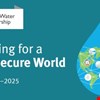
/ Southern Africa
GWPSA Strategy 2020-2025 to focus on Mobilizing Investments for A Water Secure Southern Africa
The Global Water Partnership Southern Africa (GWPSA) will be launching its Strategy for 2020 – 2025 themed “Mobilizing Investments for A Water Secure Southern Africa”, to its partners in Pretoria, South Africa. The Strategy, to be launched at a meeting to mobilize investments for a water secure southern African region, will guide how GWPSA will focus its work between 2020 and 2025 in line with the GWPO Global Strategy.

/ Southern Africa
Call for nomination of GWPSA Regional Board Members
The Global Water Partnership Southern Africa (GWPSA) seeks to fill three positions on the Regional Board. The three nominated Board Members are expected to serve on the Board for a four-year Term from Nov 2019-Nov 2023.

/ Southern Africa
Call for nominations of GWPSA Regional Chair
The Global Water Partnership Southern Africa (GWPSA) is reaching out to all its Partners to search for a new Regional Chairperson. The new GWPSA Chair will serve for a four-year term from November 2019- November 2023.

/ Southern Africa
SADC convenes workshop to validate the WEF Nexus Framework and test the Nexus Tool
The Southern African Development Community (SADC) Secretariat, with support from Global Water Partnership Southern Africa (GWPSA), is convening a Regional Workshop on the Regional Water Energy Food (WEF) Nexus Framework and testing the SADC WEF Nexus Investment Project Screening Tool. The workshop is held in Johannesburg, South Africa on 17-18 September 2019.

/ Southern Africa
Pan-Africa Training on International Water Law and Water Governance - Improved Transboundary Water Investment in Africa
GWP is organising a training on Water Governance and International Water Law (IWL) in Africa together with partner organisations. The training takes place in Kampala, Uganda, 11-14 November 2019. The deadline to apply is 6 September

/ Southern Africa
Youths call for support in capacity development to realise their impact
We need strategic partners who can assist us with Leadership and Entrepreneurship training, to deliver on the envisaged impact to the benefit of the youth, the economy and environmental sustainability within the Southern African Development Community (SADC) and the continent as a whole, says the Youth.

/ Southern Africa
GWPSA partners call for strategic investments in Water Security
Strategic investments and strengthening of multi-stakeholder partnership are key to progressing towards water security, says Global Water Partnership Southern Africa (GWPSA) Partners.

/ Southern Africa
Botswana Water Partnerships accredited to GWPO
The Global Water Partnership Organization (GWPO) has accredited Botswana Water Partnership as the official country water partnership (CWP) responsible for leading and coordinating programmes and activities in the country.

/ Southern Africa
Water resources management key to Africa’s sustainable development
The African continent is endowed with vast water resources, which if not managed and developed well, cannot support food and energy production as well sustainable development - says Dr. Kuiri F. Tjipangandjara, Global Water Partnership Southern Africa (GWPSA) Board Chairman.

/ Southern Africa
GWP Network Meeting 2019
GWP's annual Network Meeting 2019 is coming up. Based on the successful participation of so many Partners at last year’s meeting, an online ‘Follow the Sun’ consultation will be held on 25-26 June. GWPSA's consultation will take place on the 25th June 2019 from 12:00-14:00.